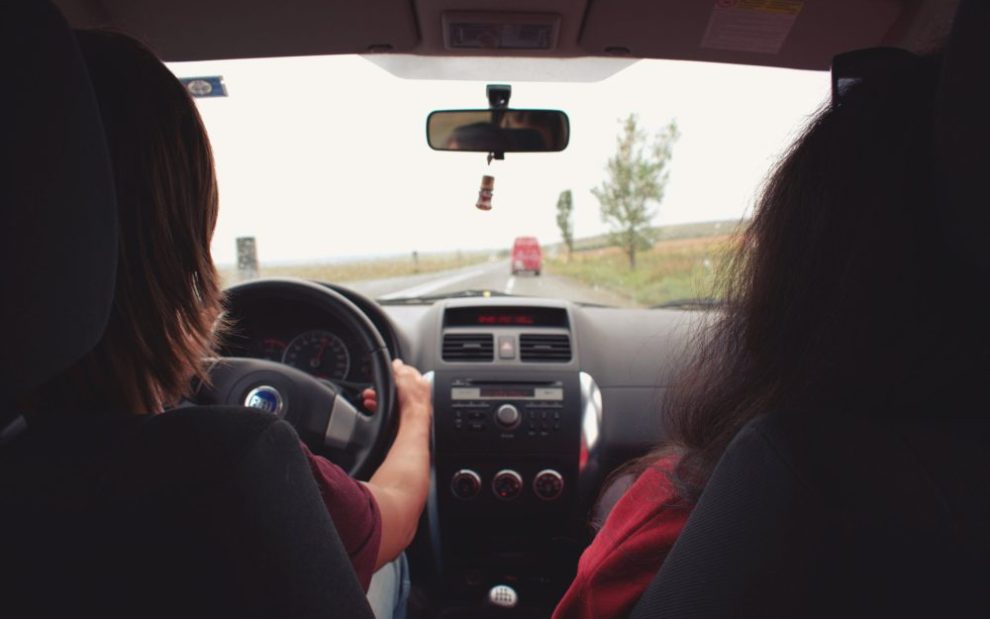It’s a Tuesday evening, and I’m turning to walk down the hall toward my office after a church event. The last volunteer, P, is saying goodbye. As she’s on her way out the door, I call, “Would you mind giving me a ride home?”
As an adult non-driver living in a large city with mediocre public transportation, I ask for rides a lot. Sometimes I ask for rides to an event, to a friend’s house, or to an appointment, but most frequently I ask for rides home. I ask for rides home from my partner, from my family, from my friends and community, from my colleagues, and, most intimidatingly, from congregants.
P, like so many people who give me rides, is genuinely happy to oblige. I grab my backpack from my office and follow her out the door to her car. We spend the short drive talking about her experience in my neighborhood; she used to commute every day to work, I learn, first as a school librarian and then as an organizer for peace and nonviolence just down the street from my house. We talk about how she got connected to the church, in what roles she’s served over the years, and what she thinks about current programming for families (my area of ministry). By the time P drops me off at my house, I’ve learned more about her in 10 minutes than I had in over a year of working closely with her as a lead volunteer and committee member.
Asking for and giving rides is a common cultural experience in my disability communities. I think of my friend B, who is blind and unable to drive. She has found that of all her friends, her disabled friends are the ones most enthusiastic about offering her rides. They understand what it feels like to need another person for support, and they are happy to provide that support to B when she needs it. Similarly, B, sharing that same understanding, supports many of her disabled friends through their mental health crises, neurodivergent processing, and chronic pain management.
Mia Mingus, a longtime disability justice and transformative justice organizer, writes about exactly this sort of interdependence, especially as it is learned from and with the disability community:
The myth of independence is the idea that we can and should be able to do everything on our own and, of course, we know that that’s not true. Someone made the clothes you’re wearing now, your shoes, your car or the mass transit system you use; we don’t grow all our own food and spices. . . . We are dependent on each other, period. Interdependence moves us away from the myth of independence, and towards relationships where we are all valued and have things to offer.
My disability community teaches me that not only is asking for and receiving rides a valid form of getting around; it is also one small practice that can help create the truly interdependent world we all need.
Interdependence has been a lifeline and a blessing for me. As a young woman in ministry, new to my role, I felt massively insecure when I first asked P for a ride. I was worried that she would think less of me for not driving, that she would question my authority, or that she would lose respect for me as a leader. But I found those fears unrealized, and even my understanding of “authority” shifted. Instead of needing to appear almighty and self-sufficient as a leader, asking for and accepting a ride home allowed me to practice real interdependence: I was able to minister to (and with) P as I practiced deep listening to her stories, and she was able to minister to me by driving me home.
As I grew into my role at the congregation and into my confidence in the blessing of interdependence, I asked for rides from congregants more frequently. What began with me tentatively asking, “Could you give me a ride home?” turned into congregants putting the question back to me: “Do you need a ride home?” or, my favorite, “Can I give you a ride home?”
Over and over, I learned that there is something sacred about sitting side by side in an informal environment—instead of the formality of a Zoom call or being face-to-face in a café—that makes space for a deeper level of vulnerability, remembering, and storytelling. On various car rides, I’ve learned about a father dying in prison, about a painful fertility journey, and about challenges parenting adult children. I can’t think of another format in my professional relationship with these congregants that would have elicited such personal stories.
I do my best to practice a “sacramental worldview,” striving to recognize God’s real presence in our complicated world all the time, especially when we least expect it. I feel that real presence in a special way in these shared rides. According to the U.S. Conference of Catholic Bishops, while “the visible reality we see in the Sacraments is their outward expression . . . the invisible reality we cannot ‘see’ is God’s grace.” The USCCB continues, “Our response to the grace of God’s initiative is itself a grace or gift from God by which we can imitate Christ in our daily lives.”
When I receive rides home from congregants, the visible reality is the carpool. Neighboring drivers and passengers can look over and see the two of us sitting in the car, driving west through the city on side streets from the church to my house. If they were to encounter us at the beginning of the drive, they would certainly hear the requisite apology for the “mess,” which is offered with the same intensity whether there are literal garbage bags adorning the front seat or one minuscule crumb on the floor mat. And if they were to catch us at the end of the ride, they might observe, as I do, my driver covertly scanning (and occasionally quizzing me on) the many political signs in my front yard.
But the invisible, the intangible, is the grace that manifests in that 11-minute drive from the church to my home. Grace is required to ask for a ride, and grace is required to offer one. There is grace in sharing a vulnerable story with a passenger, and grace for receiving that story with tenderness and care. There is grace in trusting another person to drive safely, and grace in trusting a passenger to give you directions on an unfamiliar route. Grace abounds on the ride home, a sacramental, transforming grace that leaves both driver and passenger more open, more curious, and more connected.
I don’t know if you drive, or if you ask for rides often, or when you’ve last given someone a ride home. But I do know that across diverse identities and experiences, we share a common call: a call to interdependence, a call to live into the truth that we need one another all the time and without exception. I pray that you’ll respond enthusiastically when that call finds you, that you’ll ask for what you need and offer what you have. I pray that you clear off your passenger seat, that you listen to your driver’s stories. And, most important, I pray that we all find our way home—together.
This article also appears in the April 2024 issue of U.S. Catholic (Vol. 89, No. 4, pages 31-32). Click here to subscribe to the magazine.
Image: Pexels/Dids














Add comment